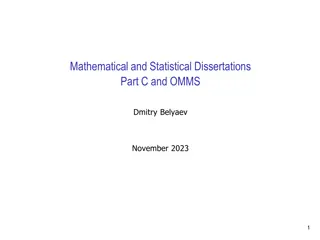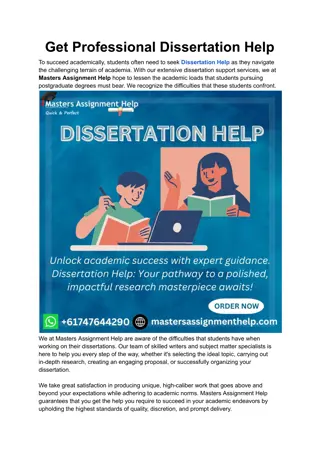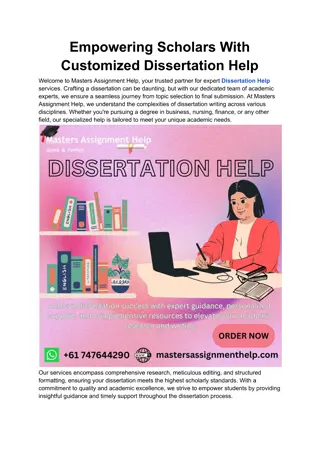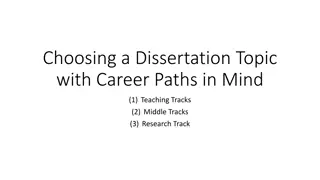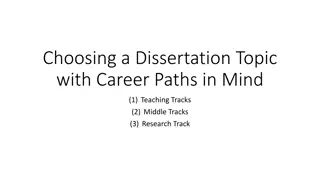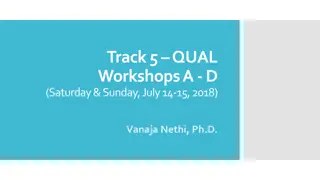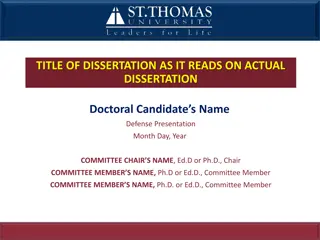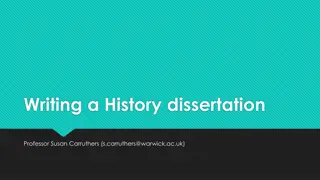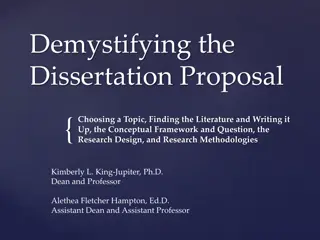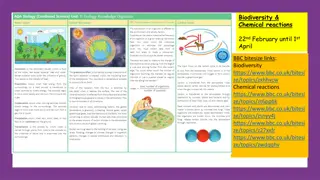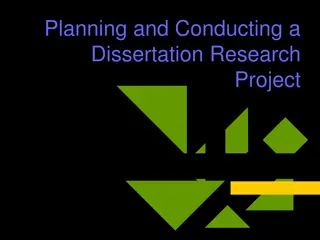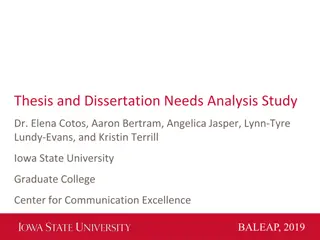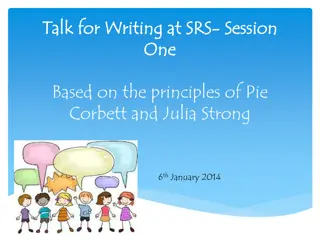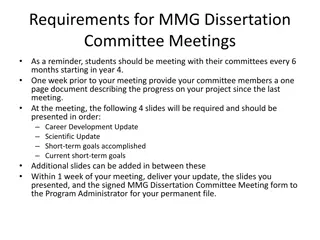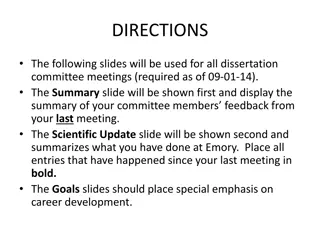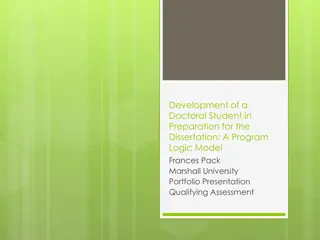
Effective Tips for Writing Your Dissertation Successfully
"Learn the structure and writing tasks involved in dissertation writing, along with the importance of starting early to ensure accuracy and progress. Begin writing alongside your ongoing research for a smoother process."
Download Presentation

Please find below an Image/Link to download the presentation.
The content on the website is provided AS IS for your information and personal use only. It may not be sold, licensed, or shared on other websites without obtaining consent from the author. If you encounter any issues during the download, it is possible that the publisher has removed the file from their server.
You are allowed to download the files provided on this website for personal or commercial use, subject to the condition that they are used lawfully. All files are the property of their respective owners.
The content on the website is provided AS IS for your information and personal use only. It may not be sold, licensed, or shared on other websites without obtaining consent from the author.
E N D
Presentation Transcript
Writing up your dissertation www.kent.ac.uk/student-learning-advisory-service
Dissertation structure Dissertation structure Writing your dissertation takes time and a number of revisions/drafts, so start writing up parts of it as soon as is practical Title Acknowledgements Abstract Contents page Main body Bibliography Appendices Introduction Background information Literature review Methodology Findings Analysis/Discussion Conclusions Recommendations
Individual writing tasks Individual writing tasks* * Abstract(200-300 stand-alone summary of all the above) Introduction(context, focus, aims, objectives of the dissertation) Literature review (summarises existing knowledge around the topic) Methodology(how you found things out) Findings(what you found out) Analysis/Discussion(understanding findings, discussing what they mean) Recommendations(any further actions suggested by those findings) Conclusions (key things those findings indicate, clarify or confirm) * Check your assignment brief for instructions/structure - not all disciplines will expect all of the above.
When to begin writing When to begin writing Your writing up can begin even whilst your research is ongoing. Perhaps you could write your methodology or literature review. Choose research area Preliminary research Decide research topic Decide methodology Submit/present proposal Finalise methodology Conduct research Analyse data Write up Submit assignment Wk10 Wk11 Wk12 Wk13 Wk14 Wk15 Wk16 Wk17 Wk18 Wk19 Wk20 Wk21 Wk22 Wk23 Wk24 Wk25 Wk26 Wk8 Wk9
Advantages of starting early Advantages of starting early The benefits of starting to write as early as possible: Writing up of findings and analysis as and when results come in can increase accuracy, authenticity and help you keep up-to-date Seeing the document evolve section by section makes it easier to adapt and shape its overall form as you progress Starting early spreads the workload, allowing you more time to revise, edit and proof-read sections as you go along It offers a self-propelling sense of progress and achievement as you see yourself moving steadily towards completion of the document
Writing requirements Writing requirements Standards of academic writing apply: Succinct, formal, objective (3rd person) academic language Clear, logical structure and signposting Critical analysis of evidence and/or findings to support your points Editing and proof-reading prior to submission Accurate referencing of all sources Guidance on the general academic skills you will need to write up a dissertation are available on the SLAS web pages: http://www.kent.ac.uk/student-learning-advisory-service The reference management tools you may need are available at: https://www.kent.ac.uk/guides/reference-management-tools
Extra presentation options Extra presentation options When writing up a dissertation, you can also make use of: Signposting techniques to help readers navigate the document - Numbered sections or chapters - Headings and subheadings - Contents page (reflecting the above) Bullet points (to distil prose into lists of key points) Charts and diagrams See: Using charts and diagrams (Online Bitesize Skills Development session) via http://www.kent.ac.uk/student-learning-advisory-service
Consider charts and diagrams Consider charts and diagrams They can supplement your writing in several ways: Evidence (to support or challenge an argument always use for a clear purpose, to help answer the question) Highlight key factors in an argument(to emphasise a key point or fact, as you might use a short, authoritative quote) Succinct powerful overview(a visual representation can instantly convey, for example, growth, decline, fluctuation) Keep the written story flowing (rather than having to stop to describe complicated data in written form) Launch points for discussion ( As the chart shows, there is )
Writing up tips Writing up tips Start somewhere easy (but start) Write it now, edit it later (write & revise, write & revise keep moving) Don t limit yourself to a keyboard (be prepared to jot down any ideas, observations or draft text as and when inspired to do so) Set word targets, but don t fixate on them (you can always add content or edit to reduce the wordcount later) Write-up research as you go along (finding/analysis/discussion/conclusion) Have a system of version control (draft 1, draft 2 etc) Allow time for final editing, proof-reading
Writing up checklist Writing up checklist Before submitting your work: Re-read the assignment brief to ensure that you have adhered to expectations regarding content and presentation Check that its contents and conclusion correspond to the aim(s) set out in the title (an adjustment to which might help align the two) Ensure that it is error-free and conforms to referencing, wordcount and other technical and academic requirements Ensure that the structure and writing style is clear and easy to follow Make sure that it is as good as it can be!
Further resources Further resources For guidance on the broader range of skills needed to write up a dissertation please go to the SLAS webpages http://www.kent.ac.uk/student-learning-advisory-service where you can: Book a one-to-one appointment with a SLAS adviser Attend a range of Online Bitesize Skills Development sessions which include Dissertations (an overview) Literature Reviews, Using charts and diagrams and Researching your dissertation
Get in touch Get in touch SLAS CONNECT To book an appointment: www.kent.ac.uk/student-learning-advisory-service learning@kent.ac.uk SLASkent KentUniSLAS SLASkent

